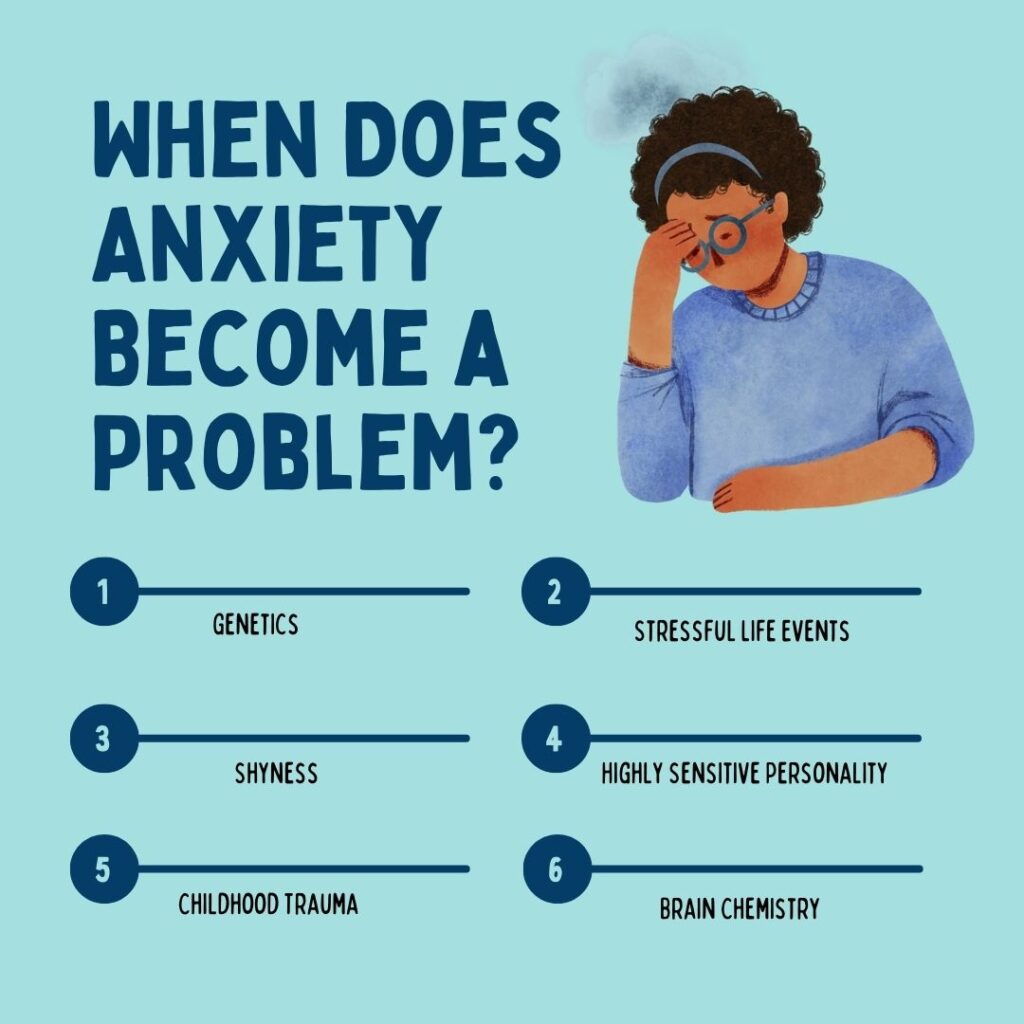Why Anxiety Happens and How to Stop It Before It Starts
Why Anxiety happens: Anxiety is a natural reaction to stress, fear, or a perceived threat. While occasional anxiety can help you prepare and stay aware, chronic or severe anxiety can disrupt your daily life. Understanding what causes anxiety and how to properly handle it might help you regain control. Here’s all you need to know to prevent and manage anxiety.

What is Anxiety?
Anxiety is an emotional and physiological state that develops in response to actual or perceived threats. It often includes:
- Worry: Concern for future events or results.
- Physical Symptoms: Increased heart rate, sweating, rapid breathing.
- Heightened Alertness: A survival mechanism intended to defend against danger.
While this response is useful in truly threatening situations, it can be troublesome when provoked by everyday obstacles or endures without resolution.
When Does Anxiety Become a Problem?
Anxiety turns into a disorder when:
- Occurs frequently and without obvious causes.
- Causes excessive concern or worry that is out of proportion to the circumstances.
- Interferes with daily life, relationships, or employment.
Common Anxiety Disorders
- Generalized Anxiety Disorder (GAD): Persistent worry about various aspects of life.
- Social Anxiety Disorder: Fear of social interactions or being judged.
- Panic Disorder: Recurring panic attacks characterized by acute dread and physical discomfort.
- Phobias: Intense fears of certain objects, circumstances, or experiences.
Why Anxiety Happens
Anxiety is influenced by a combination of factors:
1. Biological Factors
- Genetics: Family history of anxiety or mental health conditions.
- Brain Chemistry: Imbalances in neurotransmitters like serotonin and dopamine.
2. Environmental Triggers
- Stressful Life Events: Financial struggles, work pressure, or loss of a loved one.
- Childhood Trauma: Experiences of neglect or abuse can increase susceptibility.
3. Personality Traits
- Highly Sensitive Personality: A heightened emotional response to stimuli.
- Shyness: Greater risk of developing social anxiety.
How to Stop Anxiety Before It Starts
Anxiety can be prevented by developing healthy habits and coping mechanisms. Here are some ways for managing and reducing anxiety:
1. Recognize and Manage Triggers
Identifying triggers might help you anticipate and manage anxiety. Common triggers include:
- Work or school stress
- Social situations
- Health concerns
Keep a journal to chronicle your anxiety and uncover patterns.
2. Practice Mindfulness and Meditation
Mindfulness and meditation can help you focus on the present moment and lessen worry.
- Use guided meditation apps.
- Practice breathing exercises, such as the 4-7-8 technique: inhale for 4 seconds, hold for 7 seconds, and exhale for 8 seconds.
3. Maintain a Balanced Lifestyle
A healthy body promotes a healthy brain. Focus on:
- Exercise: 150 minutes of moderate activity weekly can reduce anxiety symptoms.
- Diet: Incorporate foods like salmon, green tea, and yogurt while avoiding excessive caffeine and sugar.
- Sleep: Aim for 7–8 hours of restful sleep each night.
4. Build a Support Network
Maintain social connections with trusted friends or family members. Sharing your emotions might help relieve tension and provide perspective.
How to Manage Anxiety in the Moment
When anxiety strikes, use these quick strategies to regain control:
1. Deep Breathing
Slow, controlled breaths can calm your nervous system.
- Try the box-breathing method: inhale for 4 counts, hold for 4 counts, exhale for 4 counts, and pause for 4 counts.
2. Grounding Techniques
Ground yourself by focusing on the present.
- The 333 Rule: Name 3 things you see, 3 sounds you hear, and touch 3 objects.
3. Physical Activity
A quick walk, yoga session, or stretch can release tension and shift your focus.
4. Aromatherapy and Relaxation
Use calming scents like lavender or chamomile to create a soothing environment.
When to Seek Professional Help
If anxiety persists or worsens, consider reaching out to a healthcare professional. Common treatments include:
- Talk Therapy: Approaches like Cognitive Behavioral Therapy (CBT) and Dialectical Behavior Therapy (DBT) help change thought patterns and develop coping skills.
- Medication: Anti-anxiety medications, such as SSRIs or benzodiazepines, may be prescribed for chronic anxiety.
Takeaway
Anxiety is a natural part of life, but it does not have to control you. Understanding why anxiety occurs and implementing preventive tactics might help you manage its impact. If anxiety becomes overpowering, seek professional support to develop long-term solutions.
With the correct tools and support, you can manage your mental health and thrive.